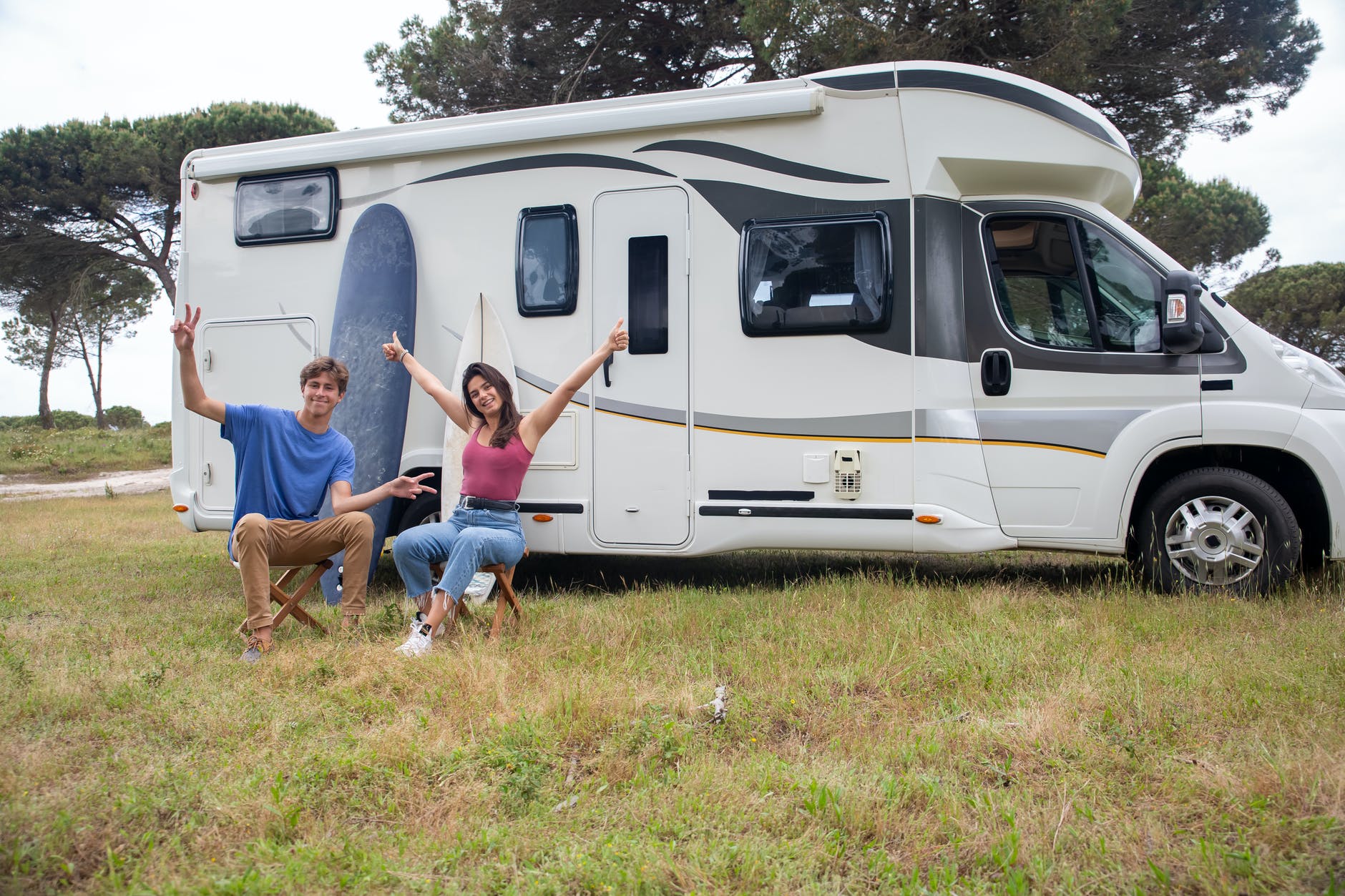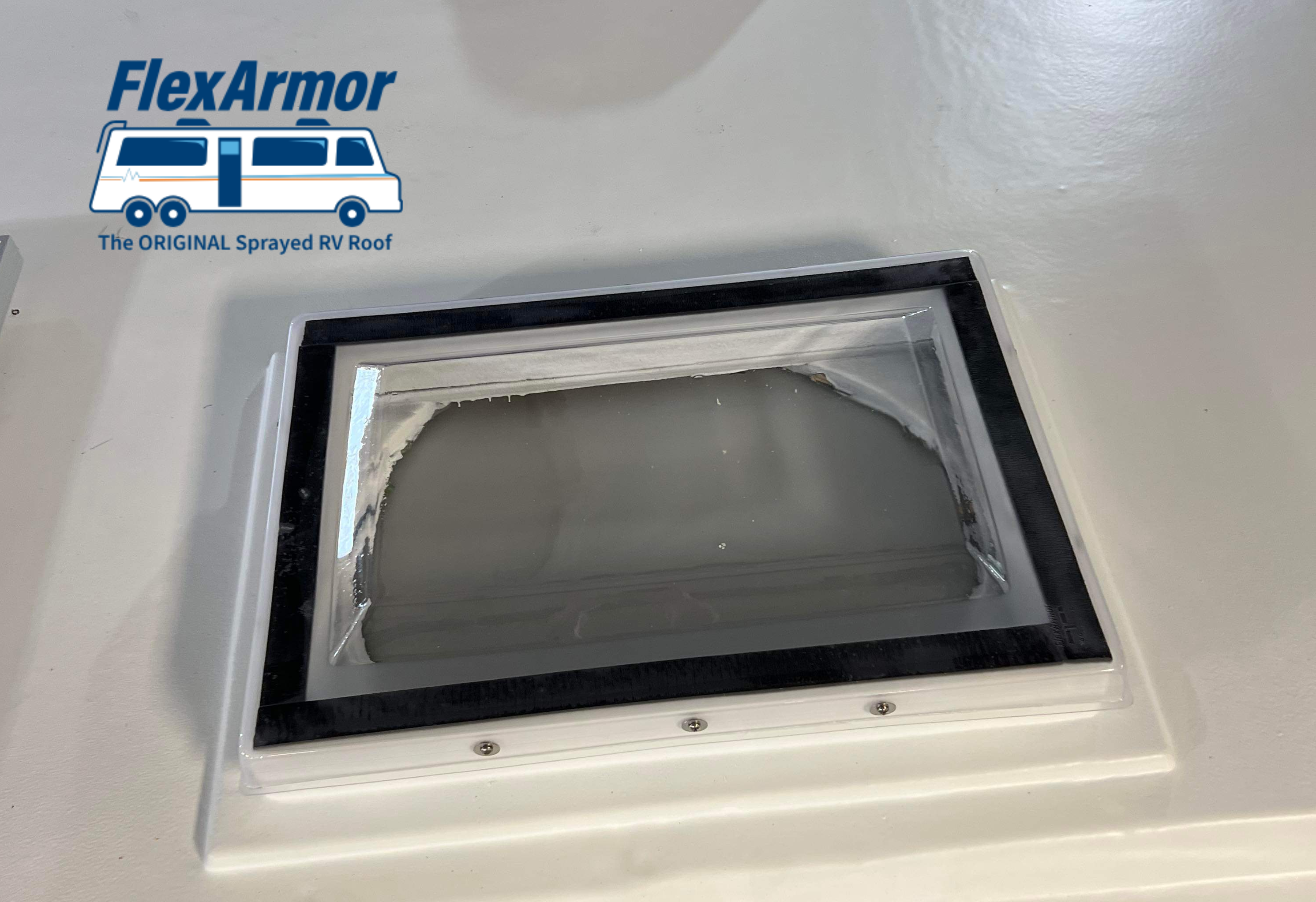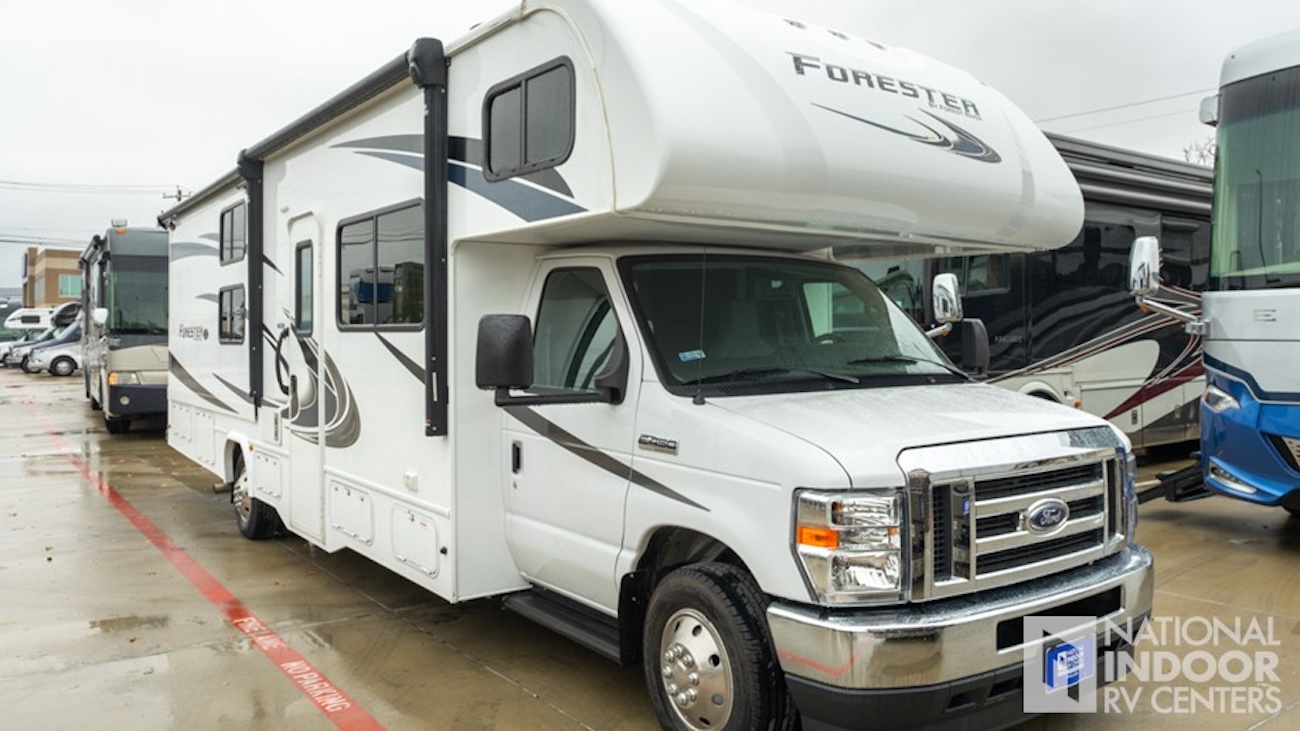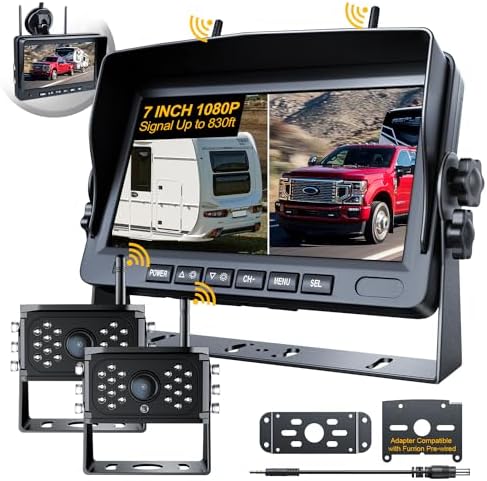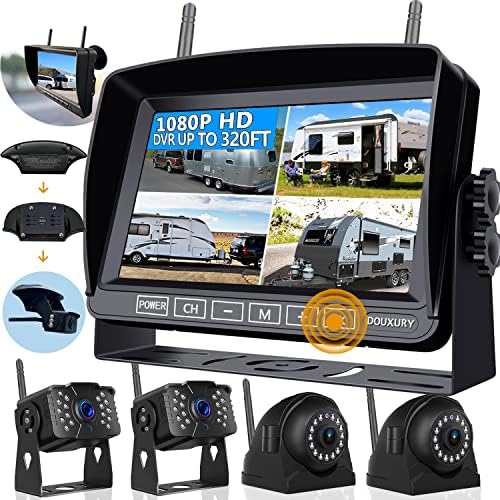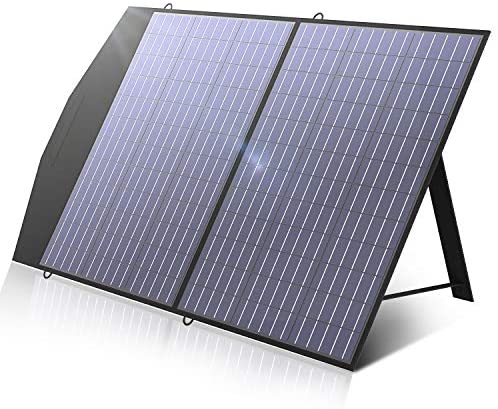So you’re thinking about buying a truck and RV? Before you make that big purchase, it’s important to consider a few things. In this article, we’ll discuss some key factors to keep in mind so that you can make an informed decision. Whether you’re a seasoned traveler or a newbie to the world of RVing, these considerations will help ensure that your truck and RV combo is the perfect fit for your needs and lifestyle. From size and weight considerations to budget and maintenance, we’ve got you covered. Let’s get started and make sure you’re on the right track to the adventure of a lifetime!

1. Truck Considerations
When choosing a truck for your RV adventures, there are several important factors to consider.
1.1 Purpose of the Truck
First and foremost, you need to determine the purpose of the truck. Will it primarily be used for towing your RV or will it serve other purposes as well? Consider whether you’ll be using the truck for everyday transportation, as a work vehicle, or solely for RV-related activities.
1.2 Towing Capacity
One of the most crucial considerations when selecting a truck for your RV is its towing capacity. It’s essential to choose a truck that can comfortably and safely handle the weight of your RV. Check the manufacturer’s specifications for the towing capacity and ensure it exceeds the weight of your RV, taking into account any additional cargo or passengers.
1.3 Size and Weight
The size and weight of the truck should align with your RV and the type of terrain you’ll be traversing. A larger truck may provide more stability and power, but it can also be less maneuverable and harder to park or navigate in tight spaces. Consider the size and weight of the truck in relation to your RV’s size and weight, as well as your own comfort level when driving.
1.4 Engine Power and Fuel Efficiency
The engine power of the truck is crucial for towing capability and overall performance. A more powerful engine can handle larger RVs and steep inclines more easily. However, keep in mind that a more powerful engine may also consume more fuel. Finding a balance between power and fuel efficiency is essential to optimize your RVing experience.
1.5 Transmission Type
The transmission type of the truck can significantly impact its performance and fuel efficiency. Automatic transmissions are generally easier to use and provide smoother shifts, which can be beneficial when towing. However, manual transmissions can offer more control and may be preferred by experienced RVers. Consider your own driving preferences and comfort level when choosing between automatic or manual transmission.
1.6 Suspension and Handling
A truck with a well-designed suspension system can enhance the overall comfort and handling, especially when towing. Look for features such as adaptive suspension or load-leveling systems that can help maintain stability and provide a smoother ride. Additionally, consider the truck’s handling characteristics and ensure it aligns with your driving style and preferences.
1.7 Cargo Space and Storage
Having sufficient cargo space and storage options in your truck is essential for carrying additional gear, supplies, and personal belongings. Look for trucks with spacious interiors, ample cabin storage, and bed features that accommodate your needs. Consider whether you’ll need additional storage options, such as exterior racks or towing compartments, to safely transport items.
1.8 Safety Features
Safety should always be a top priority, especially when towing an RV. Look for trucks that offer advanced safety features such as antilock brakes, stability control, traction control, and rearview cameras. Additional features like blind-spot monitoring, lane-keeping assistance, and adaptive cruise control can further enhance your safety on the road.
1.9 Maintenance and Repair Costs
Before making a purchase, consider the potential maintenance and repair costs associated with the truck. Research the average cost of routine maintenance, such as oil changes and tire rotations, as well as the availability of parts and servicing in your area. Additionally, explore warranty options and extended coverage plans to protect yourself from unexpected expenses.
1.10 Budget
Lastly, consider your budget for purchasing and owning a truck. Determine how much you can comfortably afford for the initial purchase, as well as ongoing expenses such as insurance, fuel, and maintenance. Remember to factor in any financing options and potential trade-ins to make the most informed decision within your budgetary constraints.
2. RV Considerations
Now that you’ve explored the essential factors to consider when choosing a truck, it’s time to shift your focus to the RV itself. Different RV types and features cater to different needs, so it’s crucial to evaluate your specific requirements before making a purchase.
2.1 Type of RV
There are various types of RVs available, from motorhomes to travel trailers and fifth wheels. Each type offers its own set of advantages and considerations. Motorhomes provide the convenience of a self-contained living space and ease of use, while travel trailers and fifth wheels offer more flexibility in terms of towing and parking. Determine which type best suits your preferences and lifestyle.
2.2 Size and Layout
Consider the size and layout of the RV in relation to your comfort and practicality. Think about the number of people who will be traveling with you, as well as your sleeping and seating requirements. Evaluate the overall floor plan, including bedroom, bathroom, kitchen, and living areas, to ensure it meets your needs and preferences.
2.3 Sleeping and Seating Capacity
If you frequently travel with family or friends, it’s essential to consider the RV’s sleeping and seating capacity. Determine the number of beds and seating areas required to accommodate everyone comfortably. Consider whether convertible furniture, such as sofa beds or collapsible dinettes, could provide extra sleeping space when needed.
2.4 Amenities and Features
Evaluate the amenities and features offered in the RV. Consider essential features such as a functional kitchen with appliances, a bathroom with a shower and toilet, heating and cooling systems, and entertainment options. Determine your must-have features and prioritize them when comparing different RV models.
2.5 Fuel Efficiency
Fuel efficiency is a significant consideration, particularly if you plan on traveling long distances or frequently moving from one location to another. Larger RVs typically have lower fuel efficiency due to their size and weight. Consider the fuel consumption of the RV and compare it to your budget and environmental concerns.
2.6 Storage Space
Having adequate storage space in an RV is crucial for organizing your belongings and keeping your living area clutter-free. Evaluate the storage options, both inside and outside the RV, to ensure they can accommodate your needs. Look for closets, cabinets, overhead compartments, and exterior storage compartments that are easily accessible.
2.7 Maintenance and Repair Costs
Similar to the truck, it’s essential to consider the maintenance and repair costs associated with an RV. Research the average costs of routine maintenance, such as oil changes and tire rotations, as well as the availability of RV-specific parts and servicing in your area. Additionally, explore warranty options and extended coverage plans to safeguard against unexpected expenses.
2.8 Budget
Determine your budget for purchasing and owning an RV. Consider both the upfront costs, including the purchase price and any necessary upgrades, as well as ongoing expenses like insurance, fuel, campground fees, and maintenance. It’s important to establish a realistic budget to ensure you can afford the RV lifestyle without undue financial strain.
2.9 Insurance
When purchasing an RV, it’s crucial to consider insurance coverage to protect your investment. Research different insurance options specific to RVs, including liability coverage, collision coverage, and comprehensive coverage. Compare quotes from different insurance providers to find the best coverage that fits your needs and budget.
2.10 RV Parks and Campgrounds
Lastly, consider the availability and accessibility of RV parks and campgrounds that suit your preferences and travel plans. Research different parks and campgrounds in areas you plan to visit and evaluate their amenities, fees, and proximity to attractions or activities that interest you. Consider whether you prefer full-hookup sites, boondocking opportunities, or a mix of both.
3. Compatibility
Once you have selected a suitable truck and RV, it’s essential to ensure they are compatible with each other to optimize your safety and towing experience.
3.1 Matching Towing Capacity
Ensure that the towing capacity of your chosen truck meets or exceeds the weight of your RV. It’s crucial to have a safety margin to accommodate any additional cargo or passengers in the RV.
3.2 Weight Distribution and Tongue Weight
Proper weight distribution and tongue weight are crucial for safe towing. Ensure that the weight of your RV is distributed evenly, with the majority of the weight placed over the axles. Additionally, confirm that the tongue weight (the downward force exerted on the hitch by the trailer) falls within the recommended range.
3.3 Hitching Mechanism
Choose a hitching mechanism that is compatible with both the truck and RV. Consult the manufacturer’s guidelines and specifications to ensure a secure and safe attachment.
3.4 Electrical Connectivity
Ensure that the truck and RV have compatible electrical connections. This includes the proper wiring for the trailer lights, brake lights, and turn signals, as well as the ability to charge the RV’s batteries while towing.
3.5 Sway Control
Sway control mechanisms can help mitigate trailer sway caused by wind, road conditions, or improper loading. Consider installing sway control devices to enhance the stability and safety of your towing setup.
3.6 Maneuverability
Evaluate the maneuverability of your truck and RV combination. Consider the turning radius, overall length, and any potential limitations when navigating tight spaces or making sharp turns.
3.7 Brake Compatibility
Ensure that the truck’s braking system is compatible with the RV’s weight and braking requirements. Consider supplementary braking systems, such as electric or hydraulic brake controllers, to enhance the safety and control of your towing setup.
3.8 Suspension and Load Capacity
Verify that the truck’s suspension system and load capacity can handle the weight and distribution of the RV. An appropriately matched suspension system is crucial for maintaining a smooth and stable ride.
3.9 Length and Clearance
Consider the overall length and clearance of your truck and RV combination. Ensure that the combination fits within length restrictions on roads, bridges, and campsites, and be mindful of overhead clearance when passing under structures such as bridges or overhangs.
3.10 Insurance
Contact your insurance provider to inform them of your RV purchase and ensure that your coverage extends to your specific truck and RV combination. Obtain the necessary insurance endorsements or additional coverage to protect your investment and ensure legal compliance.
4. Lifestyle Considerations
In addition to technical considerations, it’s essential to evaluate your lifestyle and specific needs before embarking on your RV journey.
4.1 Usage Frequency
Consider how often you plan to use your RV. Will you be a full-time RVer or a part-time traveler? Evaluating your usage frequency will help you determine the level of comfort and amenities you require from your RV.
4.2 Travel Preferences
Think about your travel preferences and the destinations you plan to visit. Are you more inclined towards scenic nature spots, bustling cities, or a combination of both? Consider the size, maneuverability, and amenities of the RV that align with your travel preferences.
4.3 Solo or Family Travel
Evaluate whether you’ll be traveling alone, as a couple, or with family and friends. The number of people you travel with will influence factors such as sleeping capacity, seating arrangements, and storage requirements.
4.4 Full-Time or Part-Time Living
Determine whether you plan to live in your RV full-time or use it for recreational purposes part-time. Full-time living may require additional considerations such as insulation, luxurious amenities, and long-term storage solutions.
4.5 Terrain and Climate
Consider the terrain and climate you’ll encounter during your RV adventures. Do you plan to travel mainly on highways or venture off-road? Are you likely to encounter extreme weather conditions? Ensure that your chosen truck and RV can handle the terrain and provide the necessary comfort and safety.
4.6 Maintenance and Upkeep
Evaluate your comfort level with maintenance tasks and the level of self-sufficiency you desire. Some RVers prefer the convenience of RV parks with full hookups and amenities, while others prefer more independent camping options. Consider the maintenance requirements and accessibility of your chosen RV.
4.7 Traveling with Pets
If you plan on traveling with pets, consider their comfort and safety in the RV. Look for RV features that accommodate pets, such as pet-friendly flooring, secure tie-downs, and appropriate ventilation.
4.8 Accessibility and Mobility
Evaluate the accessibility and mobility considerations for yourself or any travel companions with special needs. Consider features such as wheelchair ramps, wider doorways, and accessible bathrooms to ensure a comfortable and inclusive RV experience.
4.9 Future Plans
Think about your long-term plans and how they may impact your RVing lifestyle. Are you considering upgrading to a larger RV or downsizing in the future? Evaluating your future plans can help you make more informed decisions about your initial purchase.
4.10 Resale Value
Consider the potential resale value of your chosen RV. While it may not be a significant concern initially, purchasing an RV with good resale value can benefit you if you decide to upgrade or sell it in the future. Factors such as brand reputation, age, condition, and market demand can influence resale value.
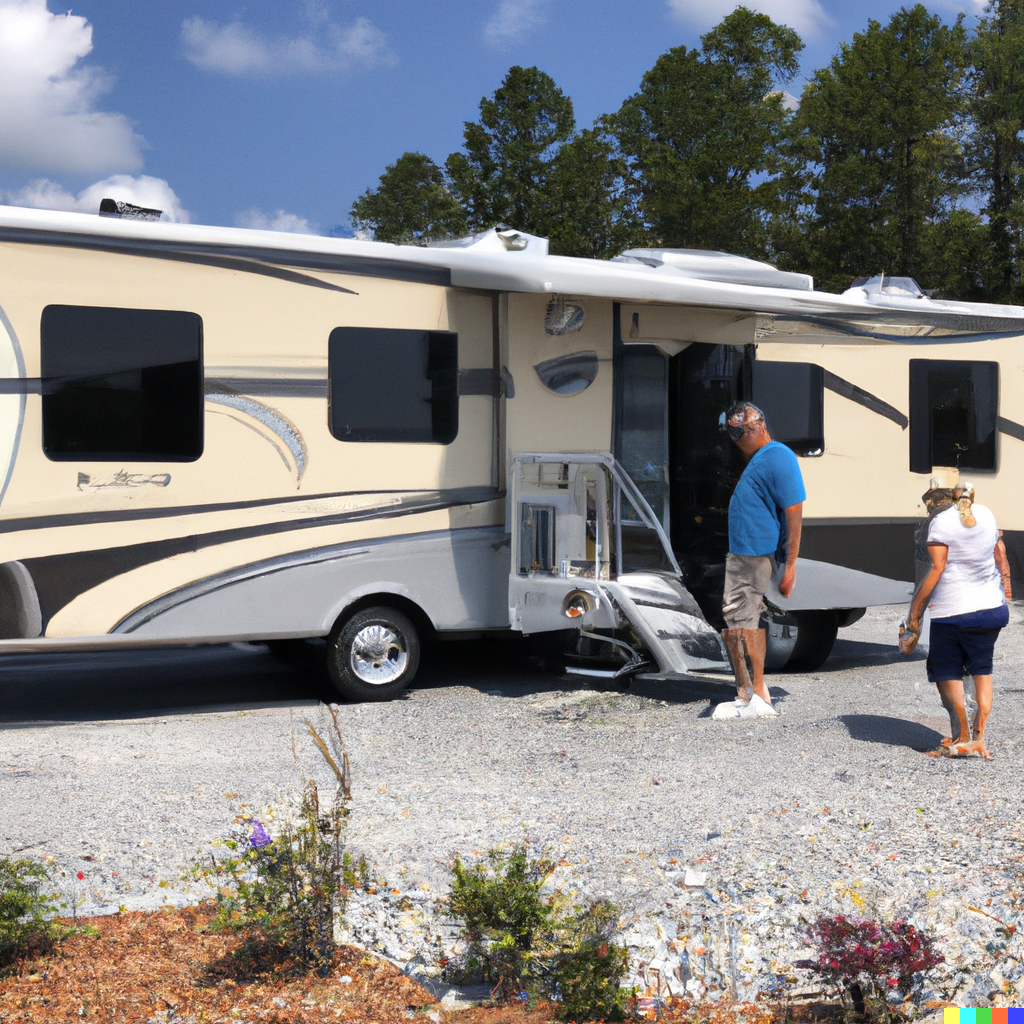
5. Legal and Regulatory Factors
RVing involves navigating various legal and regulatory factors. It’s crucial to be aware of these factors to ensure compliance and a smooth RVing experience.
5.1 Driver’s License Requirements
Verify the driver’s license requirements for operating an RV in your jurisdiction. Different states or countries may have specific license classifications or endorsement requirements for driving certain sizes or types of RVs.
5.2 Registration and Titling
Familiarize yourself with the registration and titling process for your RV in your state or country. Ensure that you have all the necessary documentation and comply with applicable registration and titling laws.
5.3 Insurance Requirements
Understand the insurance requirements specific to RVs in your jurisdiction. Consult with your insurance provider to ensure that you have the appropriate coverage, including liability, comprehensive, and collision coverage.
5.4 Weight and Size Limitations
Be aware of weight and size limitations imposed by local and national regulations. These limitations may include maximum weight and length restrictions on certain roads, bridges, tunnels, or campsites.
5.5 Safety Regulations
Stay informed about safety regulations for RVs, including requirements for seatbelts, fire extinguishers, smoke detectors, and carbon monoxide detectors. Regularly inspect and maintain these safety features to ensure compliance and protect your well-being.
5.6 RV Park Regulations
When staying at RV parks or campgrounds, it’s essential to familiarize yourself with their specific regulations and policies. This may include rules regarding quiet hours, pet restrictions, waste disposal, and site-specific guidelines.
5.7 Road Restrictions and Permits
In some areas, there may be road restrictions for oversized RVs or the requirement for special permits. Research your intended travel routes and destinations to ensure compliance with any road restrictions or the need for additional permits.
5.8 Pollution Control Standards
RVs may be subject to pollution control standards, such as emissions regulations for diesel engines. Ensure your RV complies with applicable standards and research any additional requirements for your specific RV model.
5.9 Import and Export Restrictions
If you plan to travel internationally with your RV, research the import and export restrictions of the countries you plan to visit. Ensure compliance with any customs or border control requirements before embarking on your journey.
5.10 Depreciation and Tax Considerations
Learn about the depreciation and tax considerations associated with your RV purchase. Depreciation is a natural occurrence with RVs, so it’s important to evaluate potential resale value and tax implications when making your initial purchase.
6. Residual Costs
Beyond the purchase price, there are several residual costs associated with owning an RV. It’s important to consider these costs to ensure they align with your budget and financial planning.
6.1 Depreciation
RVs generally experience depreciation over time. Understand that your RV’s value may decrease, and factor in potential depreciation when assessing your financial investment.
6.2 Fuel Expenses
Fuel expenses can form a significant portion of your overall RV budget, particularly if you plan to travel extensively. Consider the fuel efficiency of your chosen RV and plan your trips accordingly to manage fuel expenses.
6.3 Insurance Premiums
Insurance premiums can vary based on factors such as the RV type, value, usage, and coverage level. Research and compare insurance quotes to find coverage that fits your needs and budget.
6.4 Maintenance and Repairs
Routine maintenance and repairs are inevitable with any RV. Budget for regular servicing, oil changes, tire replacements, and any unexpected repairs that may arise.
6.5 Campground or RV Park Fees
Staying at RV parks or campgrounds often involves associated fees. Research the costs of different parks, both for short-term and long-term stays, to include these fees in your budget.
6.6 Storage Costs
If you require off-season or long-term storage for your RV, consider the associated costs. Storage fees can vary based on location, security features, and accessibility.
6.7 Upgrades and Modifications
Over time, you may want to make upgrades or modifications to your RV to better suit your needs and preferences. Budget for these potential costs and consider the value they may add to your RV.
6.8 Registration and Licensing Fees
Factor in the registration and licensing fees associated with your RV, which may vary depending on your jurisdiction and the type of RV.
6.9 Cleaning and Detailing
Maintaining the cleanliness and appearance of your RV is an ongoing task. Account for the costs of cleaning supplies, detailing services, and potential professional cleanings.
6.10 Cost of Accessories and Equipment
Consider the cost of essential accessories and equipment for your RV, such as leveling blocks, hoses, electrical adapters, kitchenware, bedding, and entertainment systems. Budget for these items to ensure you have everything you need for a comfortable RVing experience.

7. Financing Options
If purchasing your truck and RV outright is not feasible, there are various financing options to consider. Understanding these options can help you make an informed decision about financing your RV purchase.
7.1 Buying vs. Leasing
Evaluate whether buying or leasing your RV is the right option for you. Buying allows you to build equity and have long-term ownership, while leasing provides flexibility and lower monthly payments.
7.2 Loan Terms and Interest Rates
Research loan terms and interest rates from different lenders to get the best financing option for your RV purchase. Consider the loan duration, interest rate, and monthly installment amounts when comparing loan offers.
7.3 Down Payment and Trade-In
Determine the down payment amount you can comfortably afford and consider whether a trade-in can offset the cost of your RV purchase. The larger the down payment or trade-in value, the lower your loan amount and monthly payments.
7.4 Credit Score and Eligibility
Your credit score plays a significant role in securing favorable financing terms. Obtain a copy of your credit report, review it for accuracy, and take steps to improve your credit score if necessary.
7.5 Monthly Installments
Consider your monthly budget and cash flow when determining the maximum monthly installment you can afford. Ensure that your estimated monthly payment fits comfortably within your budget to avoid financial strain.
7.6 Repossession and Default
Understand the consequences of defaulting on your loan or falling behind on payments. Being aware of the potential risks associated with financing can help you make responsible borrowing decisions.
7.7 Pre-Approval
Consider obtaining pre-approval for financing before beginning your RV search. Pre-approval provides you with a better understanding of your budgetary constraints and enables you to negotiate with sellers from a position of financial strength.
7.8 Hidden Costs and Fees
Be mindful of hidden costs and fees associated with financing, such as loan origination fees, documentation fees, and early repayment penalties. Review the loan terms carefully to ensure you understand all financial obligations.
7.9 Insurance Financing
Explore the option of financing your insurance premiums along with your RV purchase. Some insurance providers offer financing plans that allow you to spread out the cost of your insurance premiums over time.
7.10 Negotiating the Purchase Price
Whether financing or buying outright, negotiating the purchase price of your truck and RV can result in significant savings. Research the market value of similar models and use this information to negotiate the best possible price.
8. Pre-Purchase Inspections
Before finalizing your purchase, it’s essential to conduct thorough inspections of both the truck and RV. These inspections can help identify any underlying issues or potential problems, giving you peace of mind.
8.1 Mechanical Inspection
Engage a qualified mechanic to conduct a comprehensive mechanical inspection of the truck. This inspection should cover the engine, transmission, drivetrain, brakes, suspension, exhaust system, and any other mechanical components. Address any identified issues before proceeding with the purchase.
8.2 Chassis and Frame Inspection
Inspect the truck’s chassis and frame for any signs of damage, corrosion, or structural issues. Engage a professional with expertise in frame inspections or seek advice from a qualified RV service technician.
8.3 Electrical System Inspection
Thoroughly inspect the electrical system of the truck, including the battery, alternator, starter, and wiring connections. Verify that all lighting systems are functioning correctly, both on the truck itself and when connected to the RV.
8.4 Plumbing System Inspection
If the RV has plumbing systems, conduct a plumbing system inspection to identify any leaks, faulty connections, or damage. Fill the water tanks and check for proper functioning of sinks, showers, toilets, and any other plumbing fixtures.
8.5 Appliance and Fixture Inspection
Inspect all appliances and fixtures within the RV for proper functioning. This includes the stove, oven, refrigerator, air conditioner, heater, awning, and any other installed components. Test each appliance and ensure they operate as intended.
8.6 Exterior and Interior Inspection
Conduct a detailed inspection of both the truck and RV’s exterior and interior. Look for signs of damage, wear and tear, and any potential issues that may require repairs or affect the value of the vehicle.
8.7 Document Verification
Review all relevant documents, including titles, registrations, maintenance records, and service history. Ensure that the information provided matches the condition and details of the vehicle. If purchasing from a dealer, confirm that the documents comply with local laws and regulations.
8.8 Test Drive
Take the truck and RV for a test drive to evaluate their performance and handling characteristics. Pay attention to alignment, braking ability, acceleration, and overall comfort during the drive. If possible, drive the combination on different types of roads to assess its versatility.
8.9 Professional Inspection Services
Consider engaging a professional inspection service specializing in RVs to conduct a comprehensive evaluation. These professionals can provide an unbiased assessment of both the truck and RV, giving you a complete picture of their condition.
8.10 Negotiating Repairs or Price Reduction
If any issues or concerns arise during the pre-purchase inspections, address them with the seller. Negotiate necessary repairs or a reduction in the purchase price to account for any identified issues. Ensure that any agreed-upon repairs are completed before finalizing the sale.
9. Resale Value and Depreciation
Even as you prepare to embark on your RV adventure, it’s important to consider the resale value and potential depreciation of your investment. These factors can impact your long-term financial plans and overall satisfaction with your RV ownership experience.
9.1 Factors Affecting Resale Value
Multiple factors can impact the resale value of your RV. Consider aspects such as brand reputation, model popularity, condition, mileage, and features when assessing the potential resale value of your RV.
9.2 Brand Reputation and Popularity
RV brands with strong reputations and a high level of market demand often have better resale values. Research popular brands and models known for their durability, quality, and overall desirability.
9.3 Age and Condition
The age and condition of your RV can greatly impact its resale value. Maintain your RV diligently and address any necessary repairs promptly to preserve its condition and maximize its market value.
9.4 Mileage and Usage
Mileage and usage affect the perceived wear and tear on an RV. Consider the impact of high mileage or extensive usage on the resale value, and balance your travel plans with the potential impact on your RV’s value.
9.5 Market Demand and Trends
Stay informed about the market demand and current trends in the RV industry. Research popular features, layouts, and amenities that are in high demand, as well as emerging trends that may affect the resale value of your RV.
9.6 Upgrades and Customizations
Carefully consider the upgrades and customizations you make to your RV. While upgrades can enhance your RVing experience, some may not significantly impact the resale value. Evaluate potential upgrades with a focus on features that have broader appeal in the resale market.
9.7 Documented Maintenance History
Maintain a detailed maintenance history for your RV. This history provides potential buyers with confidence in the care and upkeep of the vehicle. Keep records of routine maintenance, repairs, and any upgrades or modifications made to the RV.
9.8 Resale Methods and Platforms
Research different methods and platforms for selling your RV when the time comes. Options may include selling privately, consigning the RV with a dealership, or utilizing online RV marketplaces. Evaluate the costs, reach, and convenience of each method.
9.9 Price Evaluation and Listing
When it’s time to sell, accurately evaluate the market value of your RV. Consider consulting with professionals or utilizing online tools to determine a fair asking price. Use compelling and comprehensive listings to attract potential buyers and highlight the unique features and value of your RV.
9.10 Timing the Sale
Timing the sale of your RV can influence its resale value. Consider market trends, seasonal demand, and the age and usage of your RV when deciding the optimal time to list and sell. Be aware of potential depreciation trends and adjust your timing accordingly.
10. Finalizing the Purchase
Once you have conducted thorough research, inspections, and evaluations, it’s time to finalize the purchase of your truck and RV. Ensure that all necessary paperwork and documentation are in order and take necessary steps to make the most of your RV ownership.
10.1 Sales Contracts and Agreements
Carefully review and understand all sales contracts and agreements before signing. Ensure that all terms, conditions, and warranties are clearly outlined and that any verbal promises are documented in writing.
10.2 Vehicle Registration and Transfer
Navigate the vehicle registration and transfer process according to the local laws and regulations. Properly transfer the title and registration of both the truck and RV to your name to ensure legal compliance and ownership.
10.3 Insurance Activation and Coverage
Activate your insurance coverage for both the truck and RV as soon as possible. Contact your insurance provider and provide them with the necessary information to initiate coverage.
10.4 Extended Warranty Options
Consider purchasing extended warranty coverage for your RV to provide additional protection and peace of mind. Evaluate the available options and consult with the dealership or warranty providers to make an informed decision.
10.5 Handover and Orientation
During the handover process, carefully inspect the truck and RV with the seller or dealer to ensure they are delivered as expected. Request a thorough orientation on operating and maintaining the RV, including instructions for various systems, appliances, and features.
10.6 DMV Documentation and Taxation
Complete any necessary documentation at the Department of Motor Vehicles (DMV) to ensure proper registration and taxation compliance. Check with the local DMV office for any specific requirements related to your truck and RV.
10.7 Updating Emergency Contact Information
Update your emergency contact information with the necessary parties, including insurance providers, roadside assistance services, and any RV clubs or memberships you may belong to. Keeping this information current helps ensure a prompt response in case of emergencies.
10.8 Subscription Services and Memberships
Evaluate subscription services and membership options that may enhance your RV ownership experience. This may include access to RV-specific discounts, roadside assistance programs, or RVing communities.
10.9 Reviewing User Manuals and Guides
Take the time to thoroughly review the user manuals, guides, and documentation provided for both the truck and RV. Familiarize yourself with the recommended maintenance schedules, troubleshooting guides, and any specific operational instructions.
10.10 Making the Most of the Ownership
Embrace and enjoy your new truck and RV ownership experience. Plan exciting RV trips, take advantage of the freedom and flexibility RVing offers, and make lifelong memories with family and friends. Regularly maintain and care for your RV to ensure it continues to provide you with joy and unforgettable adventures.


